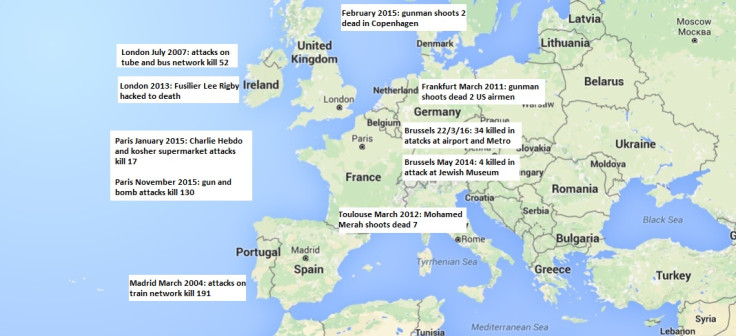Brussels attack: Belgium's capital joins list of European cities attacked by Islamists since 2004

The deadly attacks in Brussels in which at least 34 people have been killed are the latest in a growing list of attacks carried out by Islamists on European soil. Madrid, London, Paris, Copenhagen – Europeans could be forgiven for wondering where the terrorists will strike next.
However it's worth putting today's attacks into perspective. Since the attack on Madrid's rail network in 2004 killed 191 people – still the deadliest attack in Europe in recent times – some 440 people have been killed in major Islamist attacks, as well as many of the terrorists who carried them out.
Of course, Islamists are not the only ones using Europe's population as a soft target for their religious and political frustrations. In 2011, far-right extremist Anders Breivik killed 77 people, many of them teenagers, in what he claimed was a statement against the evils of multiculturalism.
The murder of prison officer Adrian Ismay in Northern Ireland on 4 March was the latest in a sporadic series of attacks carried out by maverick Republicans since the signing of the Good Friday Agreement in 1998. It's worth recalling that during the 30 years of "The Troubles" some 3,600 people were killed, mostly in Northern Ireland.

Back in Spain, the Basque separatist group ETA killed around 800 people before its ceasefire in 2011. Since the dark days of World War II, in which millions died across Europe and around the world, there have been other atrocities and campaigns, including the Bologna train station bombing of 1980, the downing of Flight 103 over Lockerbie and the activities of the Baader-Meinhof Group, not to mention the civil wars in the former Yugoslavia and The Ukraine or the Cold War.
None of this is to diminish the horrific events which took place in Brussels today (22 March 2016), but a reminder that Europe has experienced many dark days in its history, and has faced far more implacable foes than Isis.
As the media plays out footage of today's despicable attacks, the pro and anti-Europe camps try to work out how to use the attacks to their advantage, and politicians demand ever-greater surveillance, security, restriction of movement, it's worth reminding ourselves that people living in Europe probably live in the safest place and at the safest time in recorded history. Even if sometimes it doesn't feel that way.
© Copyright IBTimes 2024. All rights reserved.









